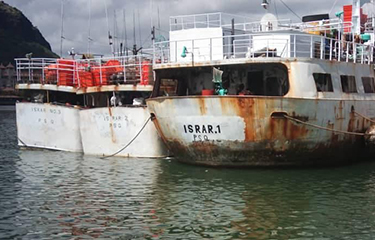Norway-based marine and energy insurance firm Hydor has decided to put an end to its contract covering a fleet of ships that were found participating in illegal, unreported, and unregulated (IUU) tuna fishing, the Environmental Justice Foundation (EJF) reported.
The fleet of three ships – currently named Israr 1, 2, and 3 – has operated in the Atlantic for years and was blacklisted in December 2021 by the International Commission for the Conservation of Atlantic Tunas (ICCAT), following an EJF report detailing the fleet’s illicit activities. EJF’s attention was first drawn to the fleet when satellite monitoring of the vessels’ movements demonstrated they were long-lining for tuna without registering with ICCAT, the regional fishery management organization that oversees the Atlantic tuna-fishing sector.
The EJF investigation included satellite tracking, social media monitoring, and interviews with crew, and found the vessels used a number of methods to evade scrutiny, including switching the flags of nations or flying none at all, changing vessel names, switching automatic identification system codes mid-voyage, and illegal transshipment.
Lacking insurance coverage, the ship’s operators are at now risk of severe financial losses, and the international ocean advocacy organization Oceana – which worked with EJF in warning Hydor on the fleet’s illicit operations – called on other insurers to follow suit by increasing scrutiny on fleets and making it more difficult for illegal fishing to continue operating. By denying coverage to vessels engaged in IUU fishing, insurers reduce operators’ access to essential services that keep them in business. It can also prevent operators from making fraudulent insurance claims by deliberately sinking their own ships – a tactic of evasion EJF said has been attempted in the past.
“I would like to commend Hydor for working with us on this case. If it was commonplace for the insurance industry to require transparency, and sever all ties with illegally fishing vessels, it would not only help to end the destruction of our ocean ecosystems and human rights abuse at sea, it would reduce the risk for insurers being damaged by such association,” EJF CEO and Founder Steve Trent said.
In many countries, insurers are prohibited by law from supporting illegal fishing operations, and may be subject to prosecution if they do. Trent said for the insurance companies involved, IUU fishing increases the risks of fraudulent claims, financial losses, and reputational damage: the activity can be linked to other crimes including human trafficking, slavery, and the transport of arms and drugs.
Oceana Europe Executive Director Pascale Moehrle called on companies to regularly consult the Combined IUU Fishing Vessel List and to require that that the vessels to which they provide services employ vessel tracking technology, and are registered with a unique vessel identifier, in order to increase transparency in the fishing sector.
Photo courtesy of the Environmental Justice Foundation







